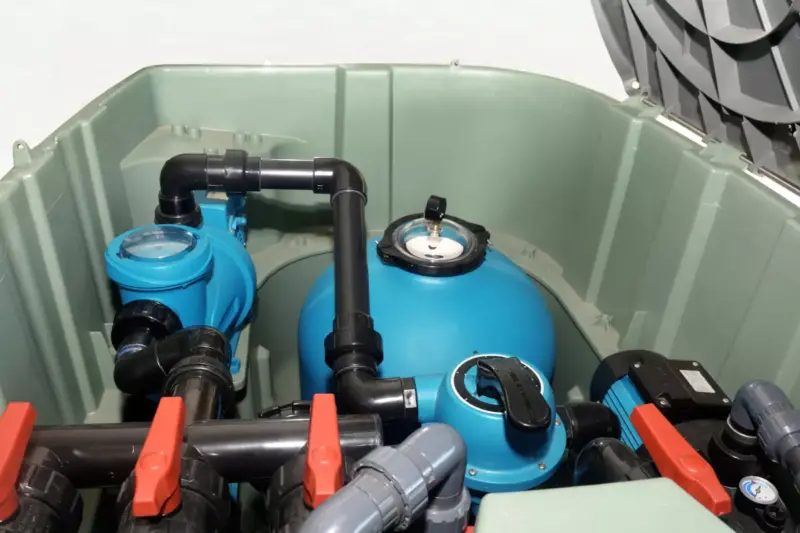
As a pool owner or soon-to-be, you understand that a pool is more than a luxury; it’s a lifestyle centrepiece. Keeping that glistening water clean and inviting is important, and being familiar with the different types of pool filters is key to choosing the right filtration system. In this guide, we explore the essentials of pool filters — from the dependable sand to the efficient cartridge and the exceptional diatomaceous earth systems.
Let’s find the perfect fit to keep your pool the sparkling heart of your backyard.
Why Pool Filtration Matters
A pool filtration system is crucial for removing contaminants from the water and keeping it safe for swimming. As you and your family enjoy the pool, debris like leaves, bugs, pet hair, and dust get introduced to the water.
Filtration continuously removes these contaminants by pumping water through a filter and back into the pool.
Particles accumulate without an effective filtration system, making water cloudy or green. Pool chemicals alone can’t keep your water pristine – good filtration is essential. Filtration also allows pool chemicals like chlorine to work more efficiently in clean water.
The 3 Main Types of Pool Filters
Three major pool filter types are used: sand, cartridge and diatomaceous earth (DE). Each has pros and cons to consider.
Sand Filters
Sand filters are the most common and affordable option in Australian backyard pools. They consist of a tank filled with specially graded sand that traps debris as water flows through. Sand filters have been around the longest and use simple, proven technology.
How sand filters work:
- Water from the pool is pumped into the filter tank full of sand
- As water passes through the sand, dirt, leaves and particles are caught in the spaces between sand grains
- Filtered water flows back out the bottom of the tank and returns to the pool
- Over time, trapped debris collects in the sand, requiring backwashing to clean
Sand filters can filter particles down to approximately 30 microns in size. This is fine enough to remove most dirt, bugs, leaves and sand that may enter the pool. However, sand filters are not as effective at trapping very fine debris.
Pros of sand filters:
- Inexpensive compared to other filter types
- Simple design with no moving parts
- Require minimal maintenance
- Easy to operate – no special skills required
- Work for all pool sizes and shapes
Cons of sand filters:
- It is not as efficient at filtering very fine particles compared to other filters
- Sand needs replacing every 5-7 years as it collects debris
- Require regular backwashing (running water through the filter in reverse) to clean, which uses extra water
Overall, sand filters are a budget-friendly and low-maintenance option suitable for most home pools in Australia. They provide adequate filtration for above-ground and small to medium-sized in-ground pools.
Cartridge Filters

Cartridge filters force pool water through a removable filter cartridge made of polyester mesh or fabric. The cartridge traps debris on its surface as water flows through. Cartridges provide better filtration of fine debris down to 10-15 microns.
How cartridge filters work:
- Water enters the filter housing containing the cartridge
- As water passes through the cartridge, particles are caught in its fibres
- Clean water flows back out to the pool
- Cartridges are removable for easy cleaning by hosing off debris
- Cartridges require replacing every 2-3 years
Pros of cartridge filters:
- Better filtration of fine debris than sand filters
- Remove small particles like dust, pollen and dirt
- Easy maintenance – simply remove and rinse the cartridge
- Use less backwashing water than sand filters
Cons of cartridge filters:
- Replacing cartridges can be expensive
- Require cleaning more often than sand filters
- Not ideal for pools with high debris load
Cartridge filters are a good choice for small to medium in-ground pools needing better fine particle filtration. Their easy cleaning makes cartridge filters lower maintenance than DE filters.
Diatomaceous Earth (DE) Filters
DE filters use a fine powder made from the fossilised remains of tiny aquatic organisms called diatoms. The diatomaceous earth (DE) powder coats filter grids and acts as the filter medium to remove the smallest particles.
How DE filters work:
- DE powder is mixed with water and pumped onto the filter grids
- The DE powder sticks to the grid, forming a porous coating
- As water flows through the DE-coated grids, even the smallest debris is captured
- After backwashing, new DE powder must be reapplied to the grids
DE filters can filter out particles down to 3-5 microns, smaller than any other residential pool filter. This makes them ideal for pools prone to debris issues.
Pros of DE filters:
- Unparalleled water filtration down to 3 microns
- Great for pools prone to debris, dirt or algae
- Long lifespan with proper care and maintenance
- Lower backwashing frequency than sand filters
Cons of DE filters:
- Most expensive type of pool filter
- DE powder is hazardous if inhaled by humans or pets
- Require vigilant maintenance of DE grids
- DE powder must be handled carefully
DE filters are the choice for inground pools needing maximum filtration. Their superior debris removal keeps large pools sparkling clean. However, DE filters require careful maintenance and have higher long-term costs than sand or cartridge filters.
Get a Free No Obligation On-Site Consultation Now
Please fill in your details below and we’ll get back to you.
Choosing the Best Pool Filter for Your Pool
With the basics covered, how do you decide which pool filter is right for your backyard? Here are the key factors to consider:
Pool Size – A basic sand filter is often adequate for small above-ground or plunge pools. Cartridge filters suit small to medium inground pools. DE filters are ideal for large inground pools, especially ones prone to debris issues.
Maintenance – All pool filters require ongoing backwashing, cleaning and part replacement. DE and cartridge filters need more frequent attention than sand filters. Evaluate how much time you want to spend on regular filter care.
Budget – Sand filters have the lowest upfront and ongoing costs. Cartridge filters cost more due to replacing cartridges but are still affordable. DE filters have a high initial purchase price and ongoing costs for DE powder.
Debris Level – If trees are prone to leaves surrounding your pool, go with a cartridge or DE filter for their superior fine debris filtration. Sand filters work better in low-debris environments.
There’s a lot to weigh up when choosing a pool filter. Consulting a pool builder can help narrow down the best option based on your pool, environment, and budget. They can also handle the professional installation and be there for ongoing maintenance.
With the right pool filtration system keeping your water pristine, you’ll be on your way to summer after summer of cool, clear backyard swimming! Reach out to discuss your pool filter needs today.





